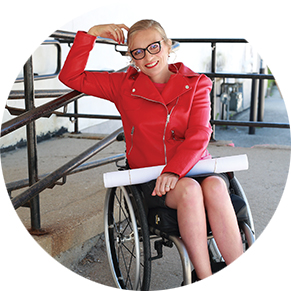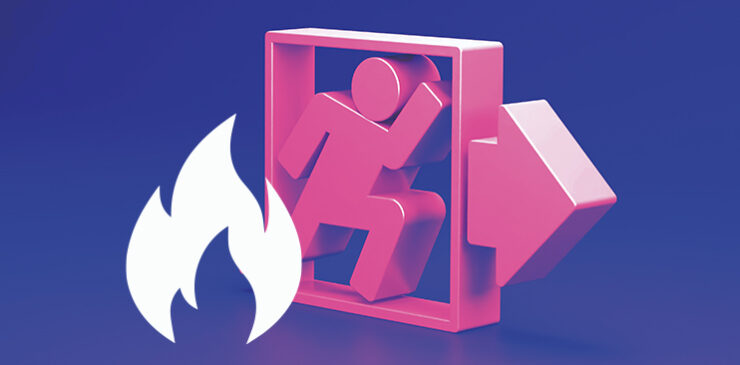Elevators are designed not to be used during a fire and become deactivated (they return straight to the ground floor without stopping) during an alarm. Every elevator bank has a sign that says DO NOT USE IN CASE OF FIRE. So where does that leave a person who can not evacuate via stairs when an alarm happens?
For me, that place was in bed, at 3:00 am, on the 10th floor.
Because here were my options:
Get up, get into my wheelchair and go out to the hallway.
Realize that the elevators were not working and that people would be leaving the building via the emergency exit stairwells. (I already knew this.)
Learn that there was no Safety Chair that could be used to carry me down the stairs (it’s a special device specifically designed for carrying people who can not walk down the stairs in an emergency situation). (I also already figured I knew this, too.)
Get out of my chair in the stairwell and bum my way down the stairs.
Have several able-bodied strangers carry me in my chair down the stairs.
I sniffed the air and detected no smell of smoke. So, I stayed put and began writing this. In hindsight, my decision was perhaps not the best one to have made, but I weighed the odds at the time and did what I thought was best for me. I do not endorse that the actions I took should be taken by others when faced with the same situation.
While I was evaluating my options, the in-room and hallway alarms were blaring so loud that I didn’t hear my phone ringing. My dear friend Samantha was calling me to see where I was and if I was okay. She was staying on the 8th floor, below me, and couldn’t get to my floor. Eventually I heard my phone, answered and heard from her perspective what was going on. She was in a stairwell with a bunch of people, all trying to figure out their best course of action. I won’t go into the details of what happened (because I wasn’t in that stairwell) but I will tell you that I was not the only wheelchair user in the building who had to make a decision about their life, that night, at 3:00 am.
When I give talks about accessibility I ask people to think of a milking stool where the three legs of that stool are SAFETY, DIGNITY and INDEPENDENCE. When you have all three legs present, and of the same length, you can sit on that stool with the confidence that you won’t fall off.
Accessibility = Safety + Dignity + Independence
During that alarm, I had to decide which of those three things to sacrifice; I opted to maintain my dignity and I stayed in bed.
Being carried down stairs by strangers, even though it may have gotten me out of the building, would have been incredibly unsafe, made me vulnerable to being dropped, breaking bones or sustaining a concussion. Bumming down the stairs would have wrecked the skin and bones on my butt and back. Also, I don’t imagine that I would have the endurance to do one flight, let alone ten. Even if I did get down ten flights I’d have no wheelchair to sit in once I got there.
Samantha coming to get me was not an option because once you get into the stairwell the only way to get out is at the bottom ― all the doors lock to prevent people from going back in. Being the Fire Safety Code Guru that Sam is, this event sent her head reeling with all the what-ifs and we (her and I) have made a plan to always be on the same floor while attending a conference…but that’s only once a year. What about all the other hotels where I stay throughout the year?
This will now become a part of my “check-in” procedure. Usually my questions are “this is the wheelchair accessible room?” and “with the roll-in shower?” and “what’s the wifi password?”
Now I’ll have to ask what their plans are for rescuing me from the #th floor in case of an alarm.
Here, there was no plan or none that was evident.
The uproar that happened the next morning was quite something. Being that we were in Vancouver for the RHF conference, the lack of attention and assistance from the hotel staff for people with disabilities was quite shocking. There were a lot of wheelchair users in the building. Some did choose to leave their rooms and bum down the stairs; one of whom was passed-by by perfectly able bodied (yet panicking) people.
Not only are wheelchair users at risk in such situations; so are those who have hearing loss and may not even know there is an alarm because the rooms also lacked visual strobe lights. Those who have vision loss will have a major challenge getting out simply because of having to navigate to, and down, the stairwell without being able to see.
This is the announcement that I could sort-of hear after the alarm ended this morning:
“We are currently investigating the cause of the alarm. Thank you for your patience.”
As I write, a second alarm has gone off. Once again, no one has knocked on my door to see if I was able to get out of my room (of course I’m still sitting in bed). What is their plan? It makes me feel quite sick, knowing that were there a real fire I would be found here, dead from smoke inhalation or worse, because no one thought to make a plan to help people, who in these emergency situations, are not able to help themselves.
The lesson? Have a plan for ALL people, for your space and for yourself. And, for heaven’s sake, practice it.

Julie Sawchuk is a best-selling author, professional speaker and RHFAC accessibility consultant. Julie combines her experience of living with a spinal cord injury with her passion for helping people make smart decisions when planning for accessibility. Ask Julie for the solutions you need at Sawchuk Accessible Solutions






